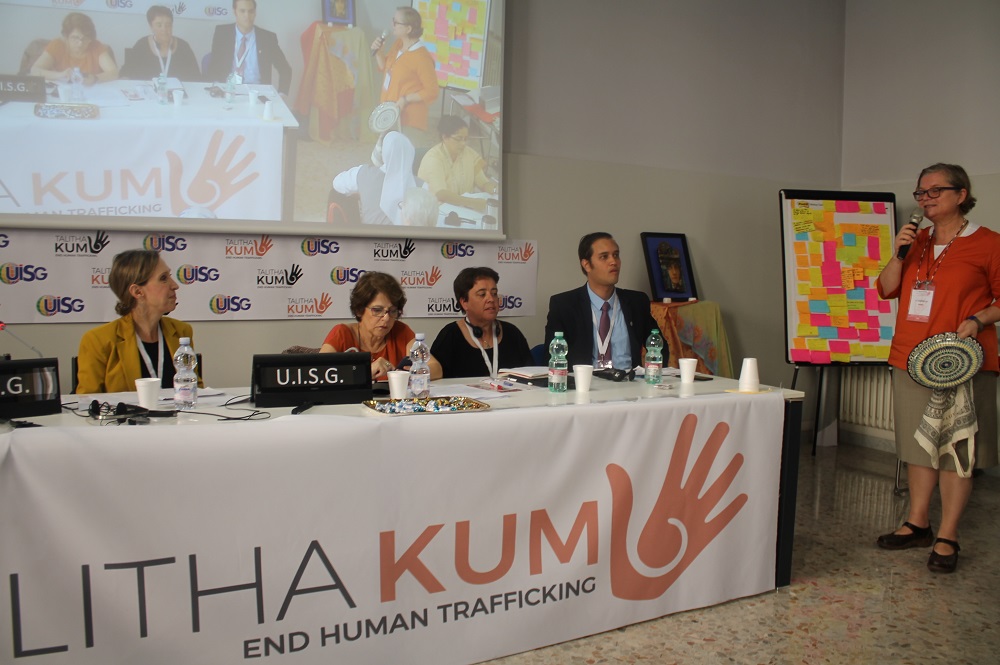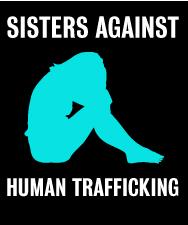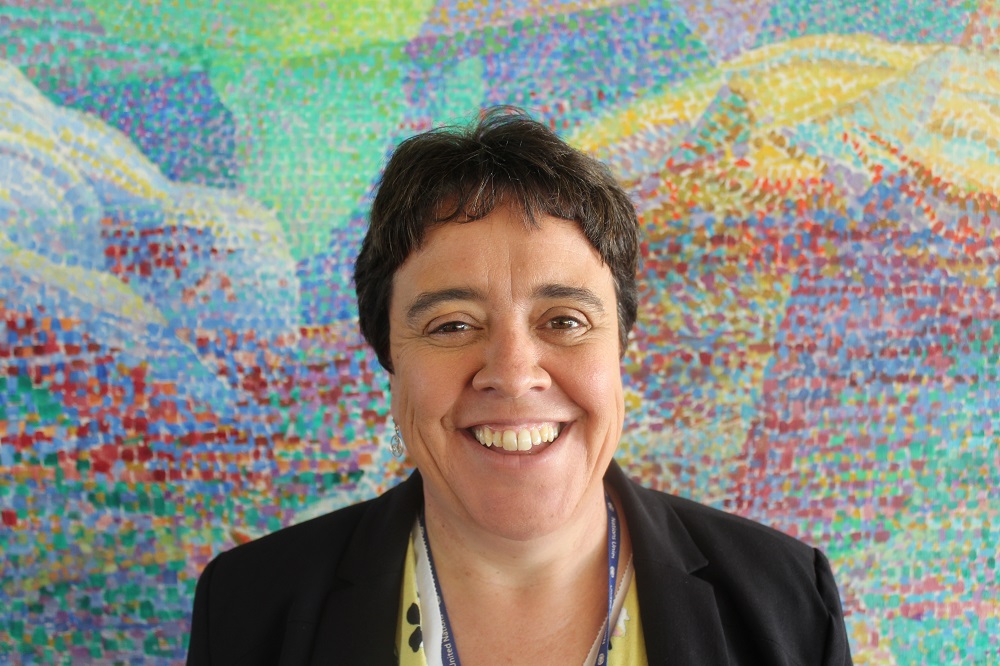
Comboni Missionary Sr. Gabriella Bottani, Talitha Kum's international coordinator, far right, speaks in front of a Sept. 23 panel addressing sisters involved in Talitha Kum. The panel included Helen Okoro, not pictured, and, from left, Teresa Albano, moderator; Maria Grazia Giammarinaro; Mercy Sr. Angela Reed; and Carlos Andrés Pérez. (Courtesy of Talitha Kum)
Editor's note: Global Sisters Report is focusing on the efforts of sisters to end human trafficking as Talitha Kum, the international anti-trafficking network of religious, launches its Nuns Healing Hearts campaign and marks its 10th anniversary in Rome this week. Since its founding in 2014, GSR has dedicated a section of its coverage to sisters who in various ways fight human trafficking. Read all of our coverage.
Australian Mercy Sr. Angela Reed recalled a survivor of trafficking in the Philippines who said to her, "You know, Sister, there are plenty of people who live in poverty, but not all are trafficked."
That provoked Reed to dig deeper when it came to the factors surrounding human trafficking, which are often simplified to fit a straightforward problem-solution paradigm, she said Sept. 23 on a panel addressing sisters who work against trafficking. The 86 delegates of women religious had come to Rome from 48 countries for the anniversary of Talitha Kum, a network of networks for sisters involved in this ministry.
"Some of the major challenges we face is to identify the problem and reframe the narrative from ... a random act of victimization to understanding and recognizing it as systemic and long-term cumulative disadvantage over one's life," said Reed, who represents Mercy International Association/Mercy Global Action at the United Nations.

GSR/Toni-Ann Ortiz
Reed pointed to "two very clear issues that need our attention," which Comboni Missionary Sr. Gabriella Bottani, Talitha Kum's international coordinator, mentioned in her opening address Sept. 21: the rejection of neoliberalism, which puts profits over people, and patriarchy, which endorses male privilege and power.
Joined by three other experts, Reed focused on vulnerabilities and what is missed when they become the emphasis in the conversation around trafficking as well as "the tendency of society to pathologize, make the victims the problem, saying they are the ones who have the problems and somehow, they are responsible for their situation.
"But survivors tell us a different story," said Reed, who is Mercy International Association's global action coordinator, overseeing her congregation's advocacy work, with a particular focus on the trafficking of women and girls.
Three expert panelists and a moderator shared the stage with Reed: Teresa Albano from the Organization for Security and Co-operation in Europe, who moderated the panel; Helen Okoro, a social educator who works with survivors in Sicily; Maria Grazia Giammarinaro, U.N. special rapporteur on trafficking in persons; and Carlos Andrés Pérez from the Global Action against Trafficking in Persons and the Smuggling of Migrants initiative under the United Nations Office on Drugs and Crime.
Advertisement
Echoing conversations sisters had earlier in the week, Reed pointed to patriarchy, sexual violence, colonialism and racism as the root causes of trafficking, and "how we define the problem determines how we think about solutions."
"It's easy to point the finger at the traffickers and say, 'They're the bad ones. If we prosecute them, the whole issue of trafficking will finish,' " Reed told GSR. "When in fact, it needs a whole-government approach. It needs governments to step up and uphold the rights of individuals, their human rights in every way within their nation-states.
"There should be opportunities for all young girls to be educated, connected to community, have decent work. So it's much easier to point the finger and say, 'We have to catch them,' but in actual fact, in some ways, we're complicit in trafficking if we let human rights violations occur and we don't tend to our obligations as duty-bearers."
In her research on human trafficking, Reed said on the panel, she found six main lenses through which the causes of trafficking are described: organized crime, globalization (traffickers can be connected with any part of the world), economics, gender subordination, local manifestations (such as colonization or military bases), and migration.

Australian Mercy Sr. Angela Reed represents the Mercy International Association / Mercy Global Action at the United Nations. (GSR file photo)
She cautioned that when it comes to migration, governments use trafficking to tighten border control as a means of prevention.
"Sometimes, policy can be used in a certain way or the way a problem is thought about can lead to wrong policy decisions, particularly short-term solutions," Reed told GSR. "And we know that in the instance of trafficking, there needs to be long-term preventative solutions. As an advocate on the global level, I'd always be challenging the narrative that trafficking is about A, B or C."
As a network, Reed said, Talitha Kum seeks to address other vulnerabilities when combating trafficking, including lack of education, rural isolation and poverty.
But sisters must also re-examine their "problem-questioning, not problem-solving ... In other words, who does this representation of the problem benefit? Who does it silence? Who is considered to be the problem? It is these and many other questions we must continue to ask."
Women religious are a part of civil society, brought up in a "faith tradition that calls us to respond to social exclusion," Reed said in an interview with media. "I think religion is political. Politics is part of being a person of the Gospel."
"Jesus upturned systems that were oppressed and called out those who showed power over the less fortunate or marginalized for whatever social, political or economic reason," she said. "I think today, we have to do exactly the same."
[Soli Salgado is a staff writer for Global Sisters Report. Her email address is ssalgado@ncronline.org. Follow her on Twitter: @soli_salgado.]







